Blog (446 found)
The Tyranny of Tier Two
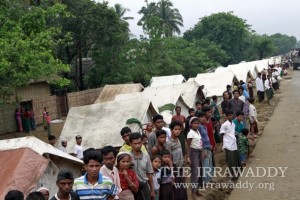 On 27 July, the U.S. Department of State released the annual Trafficking in Persons (TIP) Report for the year 2015. The report places countries around the world in one of four categories based on their commitment to enacting legislation and criminal penalties in regards to human trafficking, empowering law enforcement with the skills necessary to identify trafficking networks, and efforts to create protection services for trafficking victims. This year Burma was again given a “Tier 2” rating – which it has maintained since 2011 – implying that, “The Government of Burma does not fully comply with the minimum standards for the elimination of trafficking; however, it is making significant efforts to do so […]”
On 27 July, the U.S. Department of State released the annual Trafficking in Persons (TIP) Report for the year 2015. The report places countries around the world in one of four categories based on their commitment to enacting legislation and criminal penalties in regards to human trafficking, empowering law enforcement with the skills necessary to identify trafficking networks, and efforts to create protection services for trafficking victims. This year Burma was again given a “Tier 2” rating – which it has maintained since 2011 – implying that, “The Government of Burma does not fully comply with the minimum standards for the elimination of trafficking; however, it is making significant efforts to do so […]”
The Release of all Human Rights Defenders and Political Prisoners is a Benchmark for Free and Fair Elections
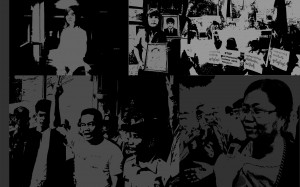 Burma Partnership and the Assistance Association for Political Prisoners (AAPP) released the joint report, “How to Defend the Defenders? A Report on the Situation of Human Rights Defenders in Burma and Appropriate Protection Mechanisms” on 25 July 2015. The report highlights the key threats that human rights defenders (HRDs) in Burma face, including oppressive legislation, a corrupt judiciary, violence and a lack of protection, as well as providing policy recommendations to relevant actors. The report points to a picture of a deteriorating human rights situation, in which the authorities are often the main perpetrators or are at least complicit in targeting, oppressing, stifling, controlling and silencing HRDs and the valuable work they carry out.
Burma Partnership and the Assistance Association for Political Prisoners (AAPP) released the joint report, “How to Defend the Defenders? A Report on the Situation of Human Rights Defenders in Burma and Appropriate Protection Mechanisms” on 25 July 2015. The report highlights the key threats that human rights defenders (HRDs) in Burma face, including oppressive legislation, a corrupt judiciary, violence and a lack of protection, as well as providing policy recommendations to relevant actors. The report points to a picture of a deteriorating human rights situation, in which the authorities are often the main perpetrators or are at least complicit in targeting, oppressing, stifling, controlling and silencing HRDs and the valuable work they carry out.
One of the key tools of repression used by the government, the report highlighted, was the use of Section 18 of the Right to Peaceful Assembly and Peaceful Procession Act (the Assembly Law), among other pieces of legislation. As stated by Bo Kyi, Joint Secretary of AAPP, “The Assembly Law continues to be used extensively by the authorities as a tool to imprison and silence HRDs… the legal system is being used to develop and implement oppressive laws, a practice that signifies the real need for legislative and judicial reform in Burma.” […]
• • •Land Confiscation Continues Unabated Across Southeastern Burma
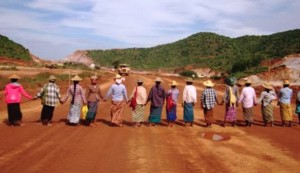 On 15 July 2015, Karen Human Rights Group (KHRG) held a briefing of their latest report on land confiscation, “‘With Only our Voices, What Can We Do?’: Land Confiscation and Local Response in Southeast Myanmar,” a follow up to the 2013 report “Losing Ground.” The report provides updated information surrounding the state of land confiscation, while also documenting the emergence of new trends in the fragile post-ceasefire environment of southeastern Burma. As a means of empowering voices on the ground, KHRG’s research team has offered detailed insights into the experiences of local villagers in their ongoing struggle against the Burma Government, the Burma Army, and both foreign and local investors who have threatened their ability to live peacefully on the land they rightfully possess […]
On 15 July 2015, Karen Human Rights Group (KHRG) held a briefing of their latest report on land confiscation, “‘With Only our Voices, What Can We Do?’: Land Confiscation and Local Response in Southeast Myanmar,” a follow up to the 2013 report “Losing Ground.” The report provides updated information surrounding the state of land confiscation, while also documenting the emergence of new trends in the fragile post-ceasefire environment of southeastern Burma. As a means of empowering voices on the ground, KHRG’s research team has offered detailed insights into the experiences of local villagers in their ongoing struggle against the Burma Government, the Burma Army, and both foreign and local investors who have threatened their ability to live peacefully on the land they rightfully possess […]
Free and Fair Elections for Whom?
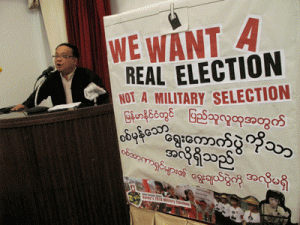 Last week, Burma’s Union Election Commission (UEC) declared that the General Elections would be set for 8 November of this year. Having previously boycotted the 2010 election on the grounds the election rules were unfair, the opposition National League for Democracy (NLD) has agreed to contest the military-backed Union Solidarity and Development Party (USDP), who currently holds power […]
Last week, Burma’s Union Election Commission (UEC) declared that the General Elections would be set for 8 November of this year. Having previously boycotted the 2010 election on the grounds the election rules were unfair, the opposition National League for Democracy (NLD) has agreed to contest the military-backed Union Solidarity and Development Party (USDP), who currently holds power […]
Burma – Where Classrooms are replaced with Jail Cells
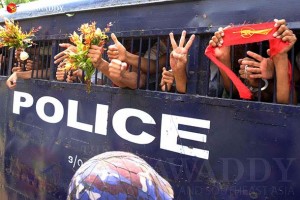 On 2 July 2015, five student protestors were charged under the controversial Peaceful Assembly and Procession Law for taking part in a protest concerning the overpowering influence of the Burma Army in Parliament. An additional four students were arrested after being involved in a graffiti protest on the campus of Yadanabon University in Mandalay. The demonstrations came as a result of the ongoing detention and subsequent unfair trials of students protesting the national education law along with the failure of Parliament to pass five out of six proposed amendments to the 2008 Constitution, most notably Article 436 […]
On 2 July 2015, five student protestors were charged under the controversial Peaceful Assembly and Procession Law for taking part in a protest concerning the overpowering influence of the Burma Army in Parliament. An additional four students were arrested after being involved in a graffiti protest on the campus of Yadanabon University in Mandalay. The demonstrations came as a result of the ongoing detention and subsequent unfair trials of students protesting the national education law along with the failure of Parliament to pass five out of six proposed amendments to the 2008 Constitution, most notably Article 436 […]
Constitutional Crackdown Brings A Dark Day for Democracy in Burma
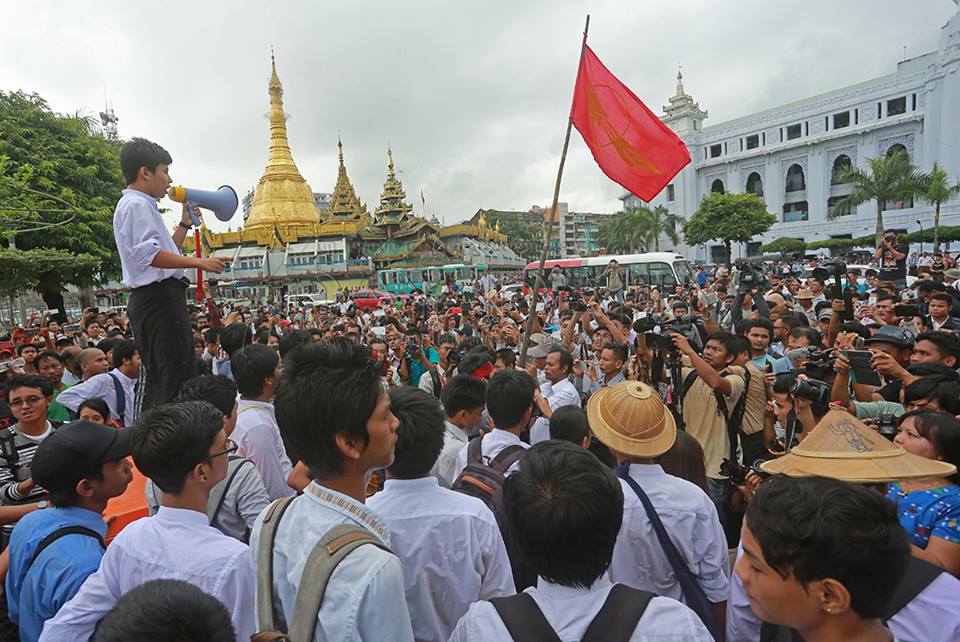 After an increasingly dispiriting start to 2015, and with landmark national elections now likely only five months away, Burma’s flimsy “reform process” is unraveling inexorably. First there was the 10 March crackdown on the nationwide student protest movement at Letpadan, Bago Region; then the Committee to Protect Journalists’ revealed that, despite much-heralded media reforms in 2011, Burma featured yet again in its 2015 rogues’ gallery of top 10 most censored countries on the planet; more recently, the refugee crisis, triggered mostly by severe state and religious persecution of the Rohingya and other Muslim minorities in Arakan State, caught the world’s attention. Meanwhile, grave human rights abuses – including sexual violence – continue unabated in ethnic conflict areas, especially in war-torn Kachin State, parts of northern Shan State and Arakan State, bringing the total number of IDPs in Burma to over 660,000.
After an increasingly dispiriting start to 2015, and with landmark national elections now likely only five months away, Burma’s flimsy “reform process” is unraveling inexorably. First there was the 10 March crackdown on the nationwide student protest movement at Letpadan, Bago Region; then the Committee to Protect Journalists’ revealed that, despite much-heralded media reforms in 2011, Burma featured yet again in its 2015 rogues’ gallery of top 10 most censored countries on the planet; more recently, the refugee crisis, triggered mostly by severe state and religious persecution of the Rohingya and other Muslim minorities in Arakan State, caught the world’s attention. Meanwhile, grave human rights abuses – including sexual violence – continue unabated in ethnic conflict areas, especially in war-torn Kachin State, parts of northern Shan State and Arakan State, bringing the total number of IDPs in Burma to over 660,000.
As the Conflict in Ethnic Areas Continues the International Community and the Burma Government Must Respect the Rights of Refugees and IDPs
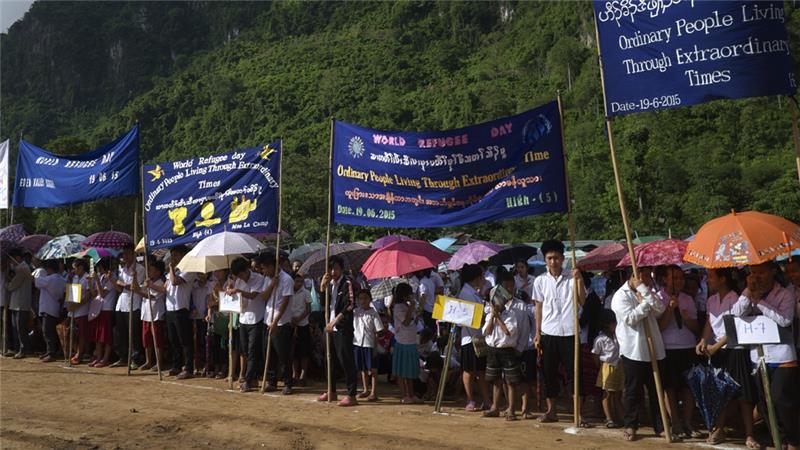 Every year on 20 June, many refugees who have fled Burma due to ongoing conflict, persecution, and human rights abuses, mark World Refugee Day with a sense of uncertainty and anxiety towards their future. This year, as the rainy season begins, refugees along the Thailand-Burma border and Internally Displaced Persons (IDPs) in Kachin, Chin, Arakan and northern Shan States, as well as other conflict-ridden areas, face severe shortages in aid. Over 220,000 IDPs are in camps in northern Burma, while a further 110,000 refugees live in a protracted refugee situation along the Thailand-Burma border. If Burma hopes to make a genuine transition towards democracy it must recognize, respect, and protect the rights of refugees and IDPs […]
Every year on 20 June, many refugees who have fled Burma due to ongoing conflict, persecution, and human rights abuses, mark World Refugee Day with a sense of uncertainty and anxiety towards their future. This year, as the rainy season begins, refugees along the Thailand-Burma border and Internally Displaced Persons (IDPs) in Kachin, Chin, Arakan and northern Shan States, as well as other conflict-ridden areas, face severe shortages in aid. Over 220,000 IDPs are in camps in northern Burma, while a further 110,000 refugees live in a protracted refugee situation along the Thailand-Burma border. If Burma hopes to make a genuine transition towards democracy it must recognize, respect, and protect the rights of refugees and IDPs […]
Another Year Passes in the War Against the Kachin, the International Community Must Pressure the Burma Government
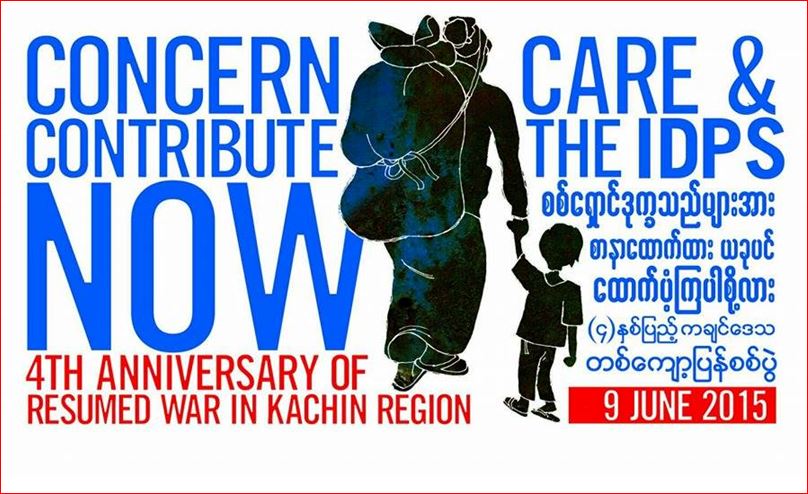 On 9 June 2015, the latest summit of ethnic armed organizations (EAOs) concluded in Law Khee Lar, Karen State. On the very same day four years ago, Burma Army broke its 17-year-old ceasefire agreement with the Kachin Independence Army (KIA), and launched a relentless offensive in Kachin and northern Shan State. As EAOs, including the KIA, were reaffirming their unity, organizations around the world displayed solidarity with those suffering from this four year war, calling for conflict to end, and humanitarian aid to be delivered to over 120,000 displaced by this bloody and ruthless war […]
On 9 June 2015, the latest summit of ethnic armed organizations (EAOs) concluded in Law Khee Lar, Karen State. On the very same day four years ago, Burma Army broke its 17-year-old ceasefire agreement with the Kachin Independence Army (KIA), and launched a relentless offensive in Kachin and northern Shan State. As EAOs, including the KIA, were reaffirming their unity, organizations around the world displayed solidarity with those suffering from this four year war, calling for conflict to end, and humanitarian aid to be delivered to over 120,000 displaced by this bloody and ruthless war […]
The Burma Government Must Stop Condoning Sexual Violence in Conflict Areas
 On 5 June 2015, Burma Campaign UK released a briefing paper that illustrated the Burma Government’s lack of action towards eliminating sexual violence since it signed the Declaration of Commitment to End Sexual Violence in Conflict (the Declaration) last year. As a signatory to the declaration, Burma agreed to prioritize prevention of sexual violence and to hold all perpetrators accountable to the full extent of the international law, amongst other related commitments.
On 5 June 2015, Burma Campaign UK released a briefing paper that illustrated the Burma Government’s lack of action towards eliminating sexual violence since it signed the Declaration of Commitment to End Sexual Violence in Conflict (the Declaration) last year. As a signatory to the declaration, Burma agreed to prioritize prevention of sexual violence and to hold all perpetrators accountable to the full extent of the international law, amongst other related commitments.
Unfortunately, not only has Burma ignored its commitments to the Declaration, it is also actively violating it, as cases of rape and sexual assault continue to emerge from conflict areas. According to Burma Campaign UK, “Given the widespread nature of sexual violence by the Burmese Army, the refusal to act, and now the violation of commitments made in the Declaration, it can only be concluded that the use of rape and sexual violence by the Burmese Army is condoned at the highest level of the government and the military.” […]
• • •A Regional Solution to the Refugee Crisis Must Address Root Causes
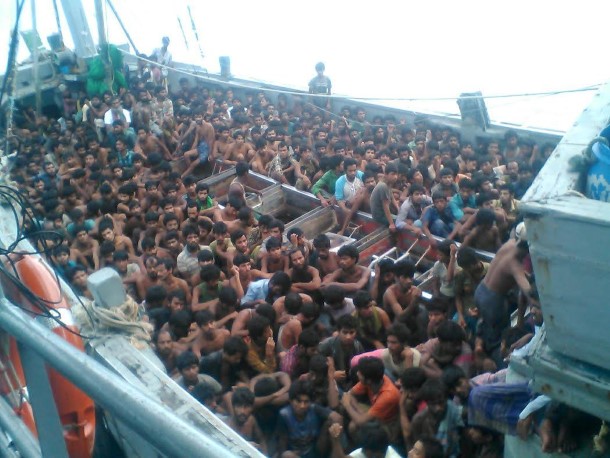 On 29 May 2015, Thailand hosted the long-awaited Special Meeting on Irregular Migration to address the unfolding refugee crisis in the Andaman Sea. The talks brought together representatives from 19 nations mainly in the ASEAN region, along with delegates from the UN High Commission for Refugees (UNHCR), UN Office on Drugs and Crime (UNODC), and the International Organization for Migration (IOM). At the time of the meeting, the Arakan Project has reported that at least 6,000 refugees, mainly Rohingya, are unaccounted for and likely stranded at sea. Victims of discrimination and denied even basic human rights back in Burma, these individuals are risking malnourishment, dehydration, and abuse in order to escape repressed lives under the Burma Government.
On 29 May 2015, Thailand hosted the long-awaited Special Meeting on Irregular Migration to address the unfolding refugee crisis in the Andaman Sea. The talks brought together representatives from 19 nations mainly in the ASEAN region, along with delegates from the UN High Commission for Refugees (UNHCR), UN Office on Drugs and Crime (UNODC), and the International Organization for Migration (IOM). At the time of the meeting, the Arakan Project has reported that at least 6,000 refugees, mainly Rohingya, are unaccounted for and likely stranded at sea. Victims of discrimination and denied even basic human rights back in Burma, these individuals are risking malnourishment, dehydration, and abuse in order to escape repressed lives under the Burma Government.
As more and more refugees are rescued from the squalid conditions at sea, survivor accounts have begun to emerge. Human Rights Watch recently published accounts that detail the dangerous journey from Burma, including stories involving traffickers intentionally abusing the refugees in order to hasten ransom demands, being forced at gunpoint into departing refugee boats, and the cramped and overcrowded conditions of the boats used to transport the refugees. A 16-year-old Rohingya girl described her experience on board the refugee boat, “When I got to the big boat … I cannot explain my feeling I was so scared. We were about 16 people in one small room. The doors were always locked. The smugglers put the food and water through a small hole, we never saw them.” […]
• • •








 All posts
All posts